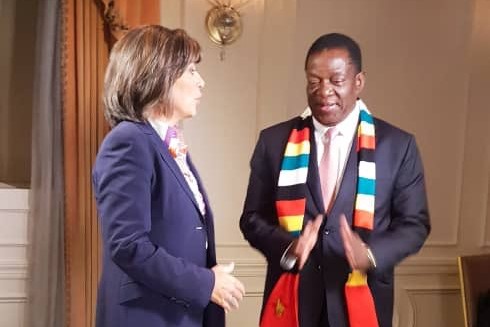By Gift Mashoko
Zimbabwe continues its engagement and re-engagement process with members of progressive regional and international communities who are willing to give the Second Republic an opportunity to pursue a developmental agenda as opposed to those nations that are pushing for regime change with the co-operation of the opposition.
Several countries have willingly come on board to assist Zimbabwe in its developmental agenda. These include the likes of Japan, Rwanda, United Arab Emirates (UAE), India, Tanzania and the UN just to mention a few. They have shown the positive side of engagement and re-engagement by demonstrating their willingness to work with Zimbabwe.
President Emmerson Mnangagwa was in Japan last week for theTokyo International Conference on Africa Development (TICAD7) where he got the chance of engaging Japanese business people and other international organisations. While in Japan, Zimbabwe managed to sign a number of Memoranda of Understanding (MoUs) with Japanese companies and these agreements will definitely see spur number of other regional and international companies to show interest in investing in the country. The MoUs will definitely increase trade and investment opportunities, the very aim of the Zimbabwe’s re-engagement drive.
The re-engagement process which Zimbabwe embarked on has seen Japan assisting Zimbabwe financially by providing grants to assist in the agricultural sector and in infrastructural development. Japan’s Prime Minister, Shinzo Abe offered support to fund Zimbabwe’s mechanisation programme in the agricultural sector so as to help the country to industrialise and thereby help it become an upper middle income economy by 2030. The infrastructure development which Japan is set to help Zimbabwe with will help Zimbabwe link with the rest of the world further strengthening the engagement and re-engagement processes and efforts.
Since the new dispensation, SADC has expressing solidarity with Zimbabwe and is calling for the immediate lifting of sanctions to facilitate social and economic recovery in the country. It is because of the President’s re-engagement efforts that when Rwandan President Paul Kagame attended the G7 Summit recently, he took the Zimbabwe’s anti-sanctions issue to leaders of the world’s most powerful nations during the summit. The G7 summit brings together leaders and policymakers from the most advanced economies including Canada, France, Germany, Italy, Japan, the United Kingdom and the United States to build consensus and look into challenging global issues.
Relations between Harare and Kigali also continue to deepen, especially under the new political administration. Of late, there have been reciprocal visits between senior officials from the two countries. This clearly shows that relations between the two nations are cordial and that they have each other’s back.
Zimbabwe’s engagement and re-engagement drive has been commended by the outgoing United Nations (UN) Resident Coordinator, Bishow Parajuli showing that President Mnangagwa and his Government are on the right track. Parajuli applauded the Zimbabwean Government for its Transitional Stabilisation Programme (TSP) and re-engagement strategy to reduce poverty. He highlighted that engaging globally and attracting investors into the country were the way to go.
The UAE has managed to assist Zimbabwe during the Cyclone Idai disaster and recently it sent in a consignment of medical equipment that was disbursed to various hospitals in Zimbabwe. This will take Zimbabwe far in its ambition to improve its health delivery system in line with modern trends.
The Washington DC-based emerging markets geopolitical analyst, Zachary Campbell Smith, has also noted the benefits of the ongoing engagements between Zimbabwe and the UAE adding that the UAE was making bold moves of investing in Zimbabwe at a time that other potential investors were adopting a wait-and-see attitude. This shows that the UAE is setting a milestone in the global investment world.
It is as a result of President Mnangagwa’s re-engagement with the international community that he managed to appeal and secure assistance for the revival of Zimbabwe’s health delivery system.
President Mnangagwa’s recent meetings with his South African and Mozambican counterparts, Cyril Ramaphosa and Filipe Nyusi, respectively, where firm commitments were made to assist Zimbabwe overcome its current energy and power supply challenges. Toward the end of August the power utility, Zimbabwe Electricity Transmission and Distribution Company (ZETDC) announced an improvement in power supplies and the easing of the ongoing load shedding.
Zimbabwe is creating a conducive investment environment which aims to see investors falling over each other to get a chance of investing in Zimbabwe. They will be looking forward to engage with President Mnangagwa and Zimbabweans themselves.
However, there are some who are obviously fighting against Zimbabwe’s success as they try to prevent Zimbabwe from developing especially under the ruling ZANU PF. EU Ambassador to Zimbabwe Timo Olkkonen, for example has accused the Zimbabwean Government of several ills like human rights abuse. One wonders what human rights abuses Zimbabwe has committed given that it fares much better than South Africa which is currently experiencing the worst xenophobic attacks against their citizens of fellow African brothers and sisters.
British Lord Peter Hain has also criticised Zimbabwe, but that will not stop Zimbabwe from its engagement and re-engagement drive in a bid to move the country forward and ensuring that the citizenry’s standard of living is improved. This will enable the promotion of food security at household level and revamping the strategic grain reserves.
Notwithstanding the spanner throwers’ efforts, President Mnangagwa’s engagement and re-engagement drive is moving on. This is despite the MDC and other detractors who are bent on spoiling the effort by cooking up fake abductions and falsified human right abuses.
These engagements will surely put Zimbabwe on the map as a safe investment destination and companies will compete to invest in the country which is rich in natural resources as well as an educated human resources base.




